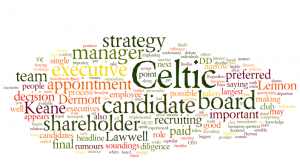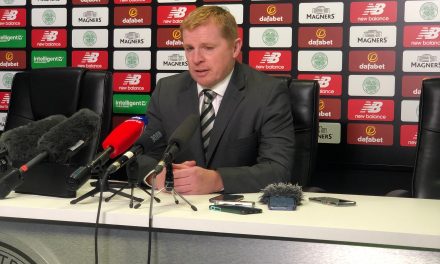 Whilst there may be some reading this headline who immediately want to engage in a wider philosophical debate on the value of executives in a capitalist economy, my headline is focusing more on the narrow point of the Celtic executive board and their role in the appointment of the next Celtic manager. Specifically their part in the decision making process and the input of Dermott Desmond.
Whilst there may be some reading this headline who immediately want to engage in a wider philosophical debate on the value of executives in a capitalist economy, my headline is focusing more on the narrow point of the Celtic executive board and their role in the appointment of the next Celtic manager. Specifically their part in the decision making process and the input of Dermott Desmond.
We all hear rumours and half-truths about the influence that Lawwell has over Celtic team matters and Dermott has over the running of the club (as I’ve joked before according to these rumours, all good singings of the past 4 years were Lennon’s and all bad were Lawwell’s) and like all tales, no doubt the truth is somewhere in between. In relation to the appointment of the next Celtic manager, there is enough detail available from people whose knowledge I would trust to prompt me to ask, as a shareholder of a business, are we wasting our money on a highly paid executive board when the largest shareholder may end up imposing his will?
Like all businesses Celtic have a corporate strategy which has been set out by the board and this is then implemented by the executive team, led by Peter Lawwell. We are all familiar with the policies and their implantation. The choice of manager is very important in implanting this strategy. He needs to support the buy and sell strategy and a requisite style of play. With the departure of Lennon there will have been a clear identikit for the manager and a strategy for recruiting the ideal candidate, which leads to the possible appointment of Keane and the role of the largest shareholder.
I do not purport to know the inner thoughts and workings at Celtic Park, but from what I’ve heard from people who are the nearest I’ll get, we have a sensible strategy for recruiting the clubs most important single employee. We asses the requirements in a candidate and review the possible candidates, we then take some soundings on personality, availability and desire to come to Scotland and narrow further to a shortlist where more diligence and direct contact begins until we finalise the candidate, ratified by the executive team.
In this instance, it appears that the soundings taken by the board have not been as positive in some areas as others on Keane, but he is the preferred candidate of DD. It now appears that Dermot is forcing through his client against the preferred direction of the board.
Regardless of his position as majority shareholder, there is an established process and criteria for appointing the manager and Celtic MUST follow it. The number of shares Dermott has should never be relevant in the boardroom. Celtic has a board comprising some talented individuals and no-one has a monopoly on good ideas. I understand the final say on appointment of MoN, WGS and Lennon was that of DD, but only after it came down to the final two candidates. Jumping the gun on his preferred candidate before that due diligence is completed and when the chances of his chosen candidate making the final 2 or 3 is not in the best interest of the club – it also begs the question of why bother with an experienced well paid executive team.
I am NOT saying the decision on Keane has been finalised. I am also not saying that should Celtic appoint Keane he won’t be a success. I am questioning why we pay a CEO £750K along with other well paid executives if, at the point of recruiting our most important single employee, the decision is taken out of their hands and is at the whim of the biggest shareholder




